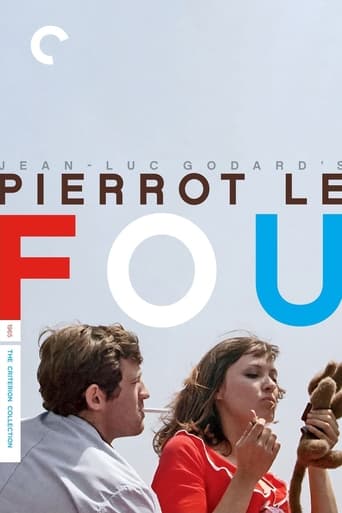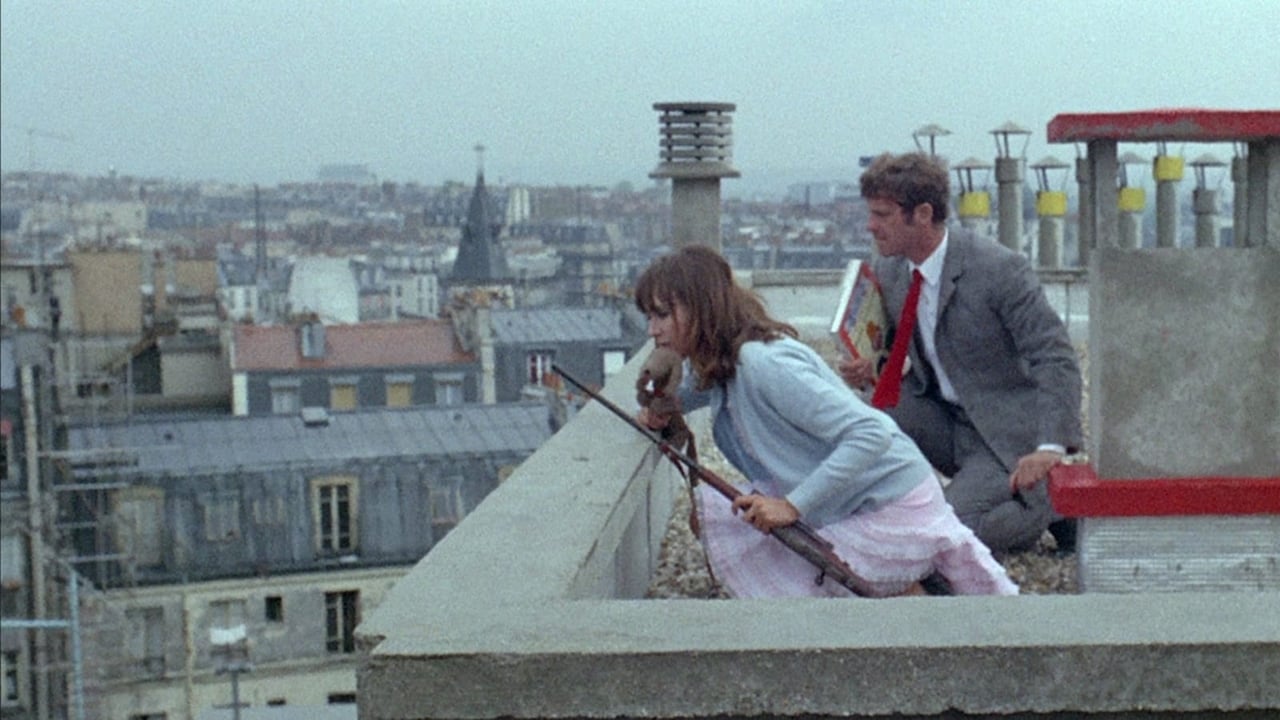elvircorhodzic
PIERROT LE FOU is a romantic crime comedy film that, through a parody treatment to the American gangster film examines human relationships and the existence in an imperfect society. This is a film that, in a messy way, shows to us a series of murders, thefts and disagreements, through a crazy love story. It is based on the 1962 novel "Obsession" by Lionel White.It is the story of Ferdinand and Marianne. He is unhappily married and has been recently fired from his job. She is a student and his ex-girlfriend. Marianne is being chased by gangsters. They become a crazed couple on the run. He reads books, philosophizing and writing his diary. She wants to sing, dance and act. Although it seems that they are crazy in love, their relationship becomes very tense...On one hand, the protagonists are intelligent madmen who are isolated in an imperfect world, on the other hand, they are young people who do not know what they want in life. The film is full of references to the history of cinema and painting, quotations from literature, music and political situation. Mr. Godard has drew a thin line between tension and impatience, which includes lies, deceit, sex and ultimately tragicomic end.The scenery is striking, characterization, which includes introverted protagonist, is quite good and the soundtrack is very pleasurable.Jean-Paul Belmondo as Ferdinand Griffon,"Pierrot" and Anna Karina as Marianne Renoir are charming and eager young people in love who want to be together, but constantly flee to themselves. Their characters lack patience and calmness. In that case, a fraud and a suicide have a different meaning.This is, perhaps, the most amusing wandering in an universal patchwork directed by Mr. Godard.
Musashi94
Godard films can be broken into two periods: before Pierrot le Fou and after Pierrot le Fou. Before, the French iconoclast was still somewhat concerned with narrative coherence; afterwards, not so much. As such, Pierrot le Fou occupies an interesting spot in his filmography as it bridges the two periods. It has a conventional plot like his earlier work, but the style is much closer to the experimental efforts that comprise the vast majority of his post-1965 output. So how does it all fit together?The narrative here is very flimsy: out protagonist Ferdinand just sort of gets swept along with Marianne's cross-country crime spree without much in the way of explanation after two brief scenes of conversation. This is not atypical for Godard, but even here we're given little justification for why the characters do anything. Ferdinand is apparently dissatisfied with his bourgeoisie lifestyle which is conveyed solely by a rather bizarre party sequence while Marianne is just a whirlwind in human form.Once the characters are on the road, the plot starts and stops randomly with plenty of scenes consisting of characters sitting around and talking about sophisticated things, a Godardian trademark. But there are also several scenes of the duo just messing around. Of the later, there is a rather offensive scene where Marianne and Ferdinand put on a skit about the Americans' current involvement in Vietnam. Marianne wears what is essentially yellow-face, Ferdinand garbles out something in broken English and the message basically boils down to "Americans are violent buffoons." I don't take offense at anti-Americanism per say (a lot of it is deserved) so much as the presentation of it and this particular scene feels crude and childish.Eventually the narrative develops into a plot involving gangsters pursuing the duo and Marianne betraying Ferdinand by running away with her real boyfriend. It just feels tacked on. Given Godard shot the whole film with no script, it's not exactly surprising and this incoherence seems to be intentional. I can't really say I'm a fan however. Nonetheless, the ending, where Ferdinand paints his face blue and blows himself up only to regret it at the last moment, is very well done and rightfully remains one of the French New Wave's most iconic moments.Stylistically the film is also a mixed bag. On the positive end of things, the film looks gorgeous. Rarely have I seen colors look so vibrant and as expressive as I've seen here. On the other hand, the dialogue gets repetitive very quickly, Ferdinand says some iteration of "My name is Ferdinand" after Marianne calls him Pierrot close to a dozen times which gets annoying. The breaking of the fourth wall, while cute at first, gets tiresome the more Godard does it. The cutaways to Ferdinand's poetry are also rather irritating especially since it adds nothing to the film unless you're fluent in French.Overall, Pierrot le Fou is a rather messy blending of Godard's narrative and experimental styles that has some nice highlights to it, but can be a bit of a slog to get through unless you just happen to really love Godard and the French New Wave. I personally enjoy the visual aspects of the film but the cerebral parts of it ended up leaving me cold. Even so, it's still entertaining enough for me to give it a hesitantly positive rating.
chaswe-28402
If you've nothing to say, why say it ? Without a few hints about the pointless story hidden in this mess, I would not have understood anything. I didn't understand anything anyway. I stuck it for about an hour, then I switched off. Endless totally disconnected jump-cuts in garish colours, it was only bearable for an hour because the actors made quite an attractive couple. I did take a look at the ending. Somebody shot her, because there was some fake red blood running all over her face. Then he painted his face blue, and blew himself up. The answer is, it was made in order to win a prize at some film festival. Godard did make "Breathless" which is a great film, which I enjoyed a great deal. I have seen some of his other films. I didn't enjoy any of them.
badajoz-1
Godard gets 2 for trying to be different, but this early sixties, experimental, existential (it has to be, doesn't it?), barely plotted, inexplicable jumble of ideas, off the cuff meanderings, and comments on what was happening in the world at the time just does not stand the test of time. It now looks mannered, pretentious, tedious, pseudo-philosophical (as if made for an in-crowd seminar critique by Jean Paul Sartre and his Left Bank Gitanes-smoking cronies), experimental colour-laden because the Director could fiddle about in homage to his European contemporaries mess of a film. Yes, Godard was revered, but 'Alphaville' and 'Breathless' were fit for cinema - this only bores you to tears with his self-indulgence masquerading as 'IMPORTANT' cinema. Belmondo survives everything, and he does here, effortlessly reading philosophy at the same time as coolly romancing an out-of-reach femme fatale. Some of the sixties cinema was crap on reflection - and this is prime off-colour rump.


 AD
AD





